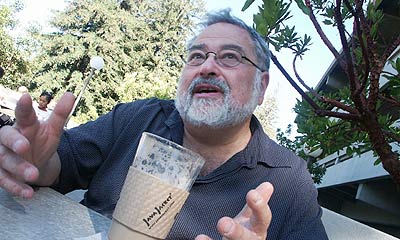The Giant In The Shadows Dilip Tirkey, an Adivasi boy, rose from one of India’s poorest regions to become the most capped player in international hockey. So why is he retiring into obscurity, asks VAIBHAV VATS
In early May, Dilip Tirkey, former Indian hockey captain and iconic defender, was playing in a small six-aside local tournament in Bhubaneswar. Suddenly during halftime, he called a few journalists present and told them he would never wear the India jersey again. This decision even caught his wife Meera unawares. “He had been talking about retiring for a long time, but I never thought he would do it like that,” she says. That evening, when he returned home, Tirkey, 32, sobbed inconsolably and refused to look at his dinner. an epoch in Indian hockey had come to an abrupt end. It could easily seem a mere writer’s trick, but in a rare irony, a few days later, Tirkey stood waiting alone outside a mall in Bhubaneswar’s upscale Jayadev Vihar area — dwarfed by a giant hoarding of Mahendra Singh Dhoni. Poignantly capturing the contrasting arcs of two sporting lives. It is a brief meeting — Tirkey is out for a private dinner. But it’s clear the lanky allegend is still coming to grips with retirement. Hockey was the fulcrum of his life. To wake up one day and suddenly abandon a way of life is disorienting. “I still cannot believe I’ve left hockey,” he says. “There’s this voice at the back of my head that keeps asking me to go to practice.” The next day, at his government bungalow in Bhubaneswar’s dour Unit 8 area, it is surprising to find a Toyota Fortuner parked at the entrance. It’s not his, he says, it belongs to his brother-inlaw. apt perhaps, because even after 15 glorious years in hockey, the story of Dilip Tirkey is far removed from the svelte world of SUVs.
Sundergarh, an adivasi district in western Orissa, bordering Chhattisgarh, is one of India’s poorest regions. Its parched, dry landscape allows cultivation just once a year. In the early part of the 20th century, as missionary activity spread in the region, it brought along another civic religion — hockey. Hockey took root like nothing else ever had — its democratic ethos far more in tune with the egalitarian structure of adivasi life than a hierarchal game such as cricket. any social occasion — birth ceremonies, weddings, festivals — could become the context for a hockey game. The prizes are a world away from the opulence of commercial sport — village teams usually play for a live chicken or a goat that later become a rare feast. The non-cultivating months from October to December become the ‘season’ — tournaments between village teams take place, in which more than 100 teams participate. Growing up in this fevered milieu, Tirkey remembers walking kilometres to watch hockey games between rival villages. “Sometimes when the games were a little farther, I borrowed a cycle,” he says. However, his father Vincent Tirkey, a CRPF man who played state-level hockey for Orissa, was not content to let his son’s obvious talent fritter away. “Dilip’s father had just one dream that his son play for India,” says Chulu Barla, the sarpanch of Saunamara village, where Tirkey grew up. The national Sports Talent Contest (NSTC) was the opportunity Tirkey was waiting for. (another young sportsman who was the beneficiary of the nSTC that year was a footballer named Baichung Bhutia). yet, for a little oversight, one of hockey’s great stories may never have begun. AK Bansal, the coach and mentor with whom Tirkey was to form a lifelong partnership, was not particularly struck by his skills in the early trials. “It was later when I was watching a practice game that I realised that the boy was exceptional,” says Bansal.
BANSAL THINKS it was not his disciple’s talent that propelled him to the pinnacle of world hockey. “If I’m honest, I would say there were a few boys even more talented,” he says. “But, it was his determination and eagerness to take up any challenge that struck me most.” Later, it was this quality that was to redeem Tirkey and set him on an unlikely course. During the nehru Cup, a national tournament for sub-juniors, Bansal found that the Orissa team was overburdened with strikers, while it lacked strength in defence. After a defender got injured, Bansal asked Tirkey — who had always played as a forward — to step up. “I always thought he would make a good defender,” he says.
Until then, Tirkey had spent an unfulfilled time on the bench. “The coach came to me and asked — defence mein khelega?” he remembers. He jumped at this chance, and irrevocably made the position his own. Later, when he was picked for the senior state team, he produced a series of sterling performances at the back. It seemed only a matter of time before the India call came. However, on his international debut,Tirkey felt a mixture of bewilderment and anxiety at the thought of sharing the dressing room with Pargat Singh, the fiery full-back from Jalandhar he idolised. It was Pargat who broke the ice. “He never abused me, even if I committed a blunder,” Tirkey says. Later, the master and the proteģe would go on to form a memorable partnership, terrorising defences with their runs on the wing. “Each knew what the other would do,” says Pargat, recalling the intuitive dynamic they shared. Miraculously, Tirkey’s career graph made its way through the turbulent and controversial world of Indian hockey like a steady, purposeful stream. From his debut in 1995 to 2001, he never missed a single game for the national team. This was as much down to his resolve to stay out of controversy as his famed fitness. “He never argued or politicked,” says Pargat. “His only interest was in playing hockey.” Pargat thinks of Tirkey as one of the most consistent players he has ever seen, but refused to be drawn on the question of his best performance. It is easy to see why — to pose that question is to open a Pandora’s box of contrasting opinions. Events and anecdotes reel off — the ball from Sohail Abbas that smashed his cheekbone in the Indo-Pak test series; leading India to victory in the 2003 Afro-Asian Games; his valiant effort against Poland in the Sydney Olympics and his rock-like presence in the gold-winning 1998 Asian Games in Bangkok. IN HIS house, Tirkey’s living room is testament to overachievement — the deluge of medals and trophies adequately reflect the career of a man who played more international international hockey games — 403 — than any other player in history. Yet, some regrets still remain, and it is these that evoke most emotion. “I was never able to win a medal at the Olympics or the World Cup, and that I will always miss,” he says.
His closest brush with Olympic glory was also the most heartbreaking. In 2000, at Sydney, India needed a win against abysmal Poland to make it to the semi-finals. The team was leading 1-0 from a Dilip Tirkey goal, and was coasting, when a lastminute equaliser struck them like a bolt from the blue. “It was like a funeral,” Tirkey says of the dressing room. “Some players were crying and others tried to console them silently.” Demoralised, India finished seventh. What did it mean for him to be only the second Adivasi to lead India? “I will never forget that moment — when I led the team out onto the pitch in the Athens Olympics. It was a dream and an honour to lead India,” he said. It is a reply as honest as it is banal. The unexpressed frisson lies in Sundergarh, 450 km away.
In the harsh dustlands that make up the periphery of Sundergarh town, there is an oasis of green. Every day in the sweltering May heat, 150 boys and girls — selected from 500 aspirants in the district’s villages — practice on the shiny green astroturf. Most of them are no more than 12, yet their serious intent belies their age. In a practice game, the whole array of skills is on display — dazzling dribbles, short, crisp passes, clean tackles, intelligent scoops — a powerhouse of raw talent that would equal the footballers from a Brazilian favela in precocity as well as poverty. Some play without shoes, as their families cannot afford to buy a pair. In a practice game, one team plays shirtless because no jerseys are available. THEIR COACH, Tej Kumar Xess, talks from the sidelines as he barks instructions intermittently. “Hockey was always popular in Sundergarh, but it exploded after Dilip Tirkey,” he says. After Tirkey’s rise to the national team, a slew of players from the region made it to the national team. Prabodh and Ignace Tirkey, Lazarus Barla and William Xalxo all became household names, and inspired another generation in turn. An answer could also be found in the two houses of Dilip Tirkey in his native Saunamara village — one stands amidst a mud-roofed cluster of huts, the other is an impressive whitewashed façade that stands next to the village church. For young kids in the village, it is evidence of the possibilities of social transformation through the wielding of a hockey stick. It is this talent and hope that Tirkey would like to nurture. Coaching is where his heart lies, but the future is uncertain. He has plans for a state-of-the-art academy in Bhubaneswar — there have been encouraging noises, but nothing more. Tirkey, who is reluctant to criticise even in retrospect, gets impassioned when hockey is the subject. “I want to adopt promising players, so that they can solely focus on hockey,” he says. However, instead of devoting all his energies to hockey, Tirkey may find himself at an accounts desk — he works as a sales manager at Indian Airlines — lost in the maze of balance sheets, taking orders from superiors. After being at the pinnacle of the game for 15 years, he has to face the prospect of going back to the rigours of a daily job. In the nether world of hockey, Tirkey has managed a few low-level endorsements (a cement company, a local cable network). It is a life of moderate prosperity — his best deal earned him Rs 30 lakh. Tirkey has often been compared to rahul Dravid, even bestowed with the same nickname — the Wall. But the similiarities end there. Can we ever imagine Dravid settling back into a mundane bank job after spending a decade in international cricket? But the awareness that hockey is a stepchild of Indian sport has engendered a sort of resignation. The last time we meet, our conversation is interrupted by a couple of fans who want Tirkey’s autograph. Tirkey is pleasantly surprised — even in his home state, he is a stranger to mass adulation. Sitting in the restaurant, Tirkey appears restive, anxious, incessantly fiddling with his unkempt mane. His replies are monosyllabic. Thoughts about the future consume him — he has a sixmonth- old son. Later that evening, he is meeting some sponsors for his academy. But even after two decades, the thought of a break away from the game that has consumed his life seems implausible — it remains his true, singular vocation. “Hockey is in my blood,” he says. He walks off shortly after, already dreaming of newer horizons in a city that may one day embrace the hero in their midst. WRITER’S EMAIL vaibhav@tehelka.com | |||||||||
'via Blog this'



 I had wanted for some time to write a novel of childhood, arising from my memories of my own childhood in Bombay. Now, having drunk deeply from the well of India, I conceived a more ambitious plan. I remembered a minor character named Saleem Sinai, born at the midnight moment of Indian independence, who had appeared in the abandoned draft of a still-born novel called The Antagonist. As I placed Saleem at the centre of my new scheme I understood that his time of birth would oblige me immensely to increase the size of my canvas. If he and India were to be paired, I would need to tell the story of both twins. Then Saleem, ever a striver for meaning, suggested to me that the whole of modern Indian history happened as it did because of him; that history, the life of his nation-twin, was somehow all his fault. With that immodest proposal the novel's characteristic tone of voice, comically assertive, unrelentingly garrulous, and with, I hope, a growing pathos in its narrator's increasingly tragic overclaiming, came into being. I even made the boy and the country identical twins. When the sadistic geography teacher Emil Zagallo, giving the boys a lesson in 'human geography,' compares Saleem's nose to the Deccan peninsula, the cruelty of his joke is also, obviously, mine.
I had wanted for some time to write a novel of childhood, arising from my memories of my own childhood in Bombay. Now, having drunk deeply from the well of India, I conceived a more ambitious plan. I remembered a minor character named Saleem Sinai, born at the midnight moment of Indian independence, who had appeared in the abandoned draft of a still-born novel called The Antagonist. As I placed Saleem at the centre of my new scheme I understood that his time of birth would oblige me immensely to increase the size of my canvas. If he and India were to be paired, I would need to tell the story of both twins. Then Saleem, ever a striver for meaning, suggested to me that the whole of modern Indian history happened as it did because of him; that history, the life of his nation-twin, was somehow all his fault. With that immodest proposal the novel's characteristic tone of voice, comically assertive, unrelentingly garrulous, and with, I hope, a growing pathos in its narrator's increasingly tragic overclaiming, came into being. I even made the boy and the country identical twins. When the sadistic geography teacher Emil Zagallo, giving the boys a lesson in 'human geography,' compares Saleem's nose to the Deccan peninsula, the cruelty of his joke is also, obviously, mine. Before the book's publication, Cape's lawyers had been worried about my criticisms of Mrs Gandhi and had asked me to write them a letter in support of the claims I was making. In this letter I justified the text to their satisfaction, except with regard to one sentence which, as I said, was hard to substantiate, as it was about three people, two of whom were dead, while the third would be the one suing us. However, I argued, as I was clearly characterizing the information as gossip, and as it had been printed before, we should be all right. The lawyers agreed; and then, three years later, this one sentence, the novel's Achilles heel, was the very sentence Mrs Gandhi tried to spear. This was not, in my view, a coincidence.
Before the book's publication, Cape's lawyers had been worried about my criticisms of Mrs Gandhi and had asked me to write them a letter in support of the claims I was making. In this letter I justified the text to their satisfaction, except with regard to one sentence which, as I said, was hard to substantiate, as it was about three people, two of whom were dead, while the third would be the one suing us. However, I argued, as I was clearly characterizing the information as gossip, and as it had been printed before, we should be all right. The lawyers agreed; and then, three years later, this one sentence, the novel's Achilles heel, was the very sentence Mrs Gandhi tried to spear. This was not, in my view, a coincidence.

 George Lakoff dissects "war on terror" and other conservative catchphrases
George Lakoff dissects "war on terror" and other conservative catchphrases 

